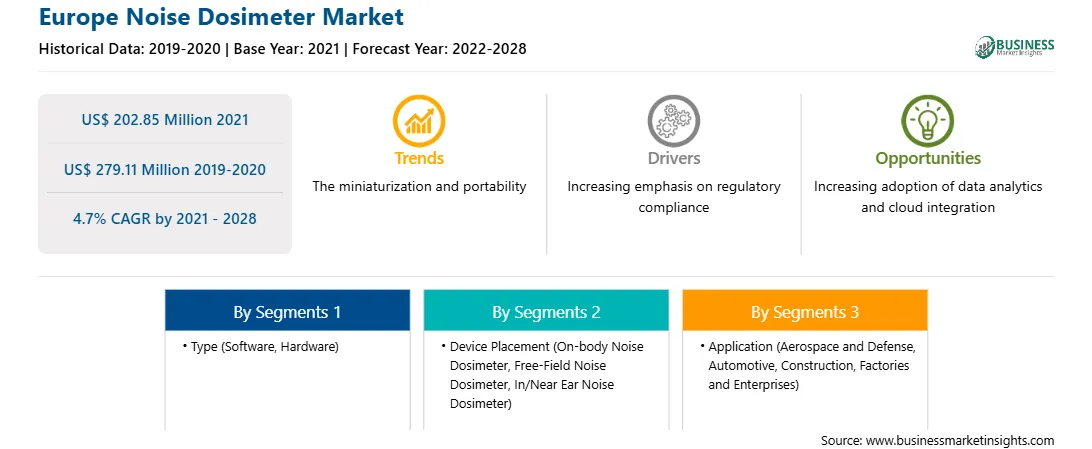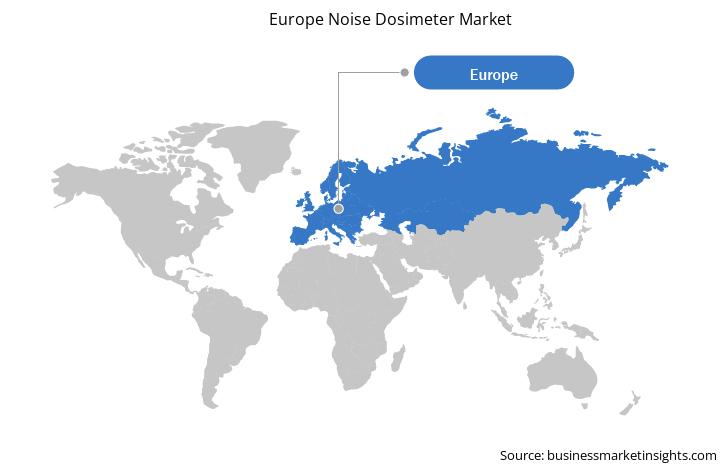The European noise dosimeter market is further segmented into France, Germany, Russia, Italy, the UK, and the Rest of Europe. Europe is a diverse market with a group of more than 40 countries in it. The Western European countries are more advanced than the Nordic and Eastern European countries, which is a key factor contributing to the high adoption of technological solutions across all industries in the western part of Europe. Economically strong countries such as Germany, Italy, the UK, and Spain have been significantly implementing advanced solutions. According to Committee for European Construction Equipment (CECE), construction is one of Europe's most important economic industries. It directly employs 18 million people and contributes over 9% of EU GDP. The region is also experiencing a high investment across three large components—new building construction, existing buildings, and civil engineering—of the construction industry. The European continent is home to some spectacular construction projects. The 18-km Fehmarn Belt Fixed Line, which will connect islands in Denmark and Germany via a tunnel beneath the Baltic Sea, has commenced construction. Borselle 1&2, the Netherlands' first offshore wind farm, is taking shape, with the capacity to power 1 million Dutch homes. Meanwhile, in Paris, the meticulous restoration of Notre-Dame will restore the world's most famous cathedral to its former splendor. Thus, this high investment in the construction industry across the region will create huge emission of noise at sites putting all its laborers in danger, thereby creating demand for noise dosimeters.
Europe is one of the major industrial hubs for information technology. The COVID-19 pandemic has led to several initiatives being adopted place to monitor noise levels trends pre and post lock down phase in European region. For instance, the Provincial Agency for the Protection of the Environment of the Autonomous Province of Trento (APPA Trento) shared the initiative to collect environmental noise levels during the emergency of COVID-19 outbreak, launched by AIA, carrying out extensive monitoring over the provincial territory both to document the acoustic climate of the province and to assess the acoustic impact of the protection measures adopted during pandemic. This indicated slight growth in the noise dosimeter market. In addition, as per a report by the Policy Department for Economic, Scientific and Quality of Life Policies, the pandemic boosted the penetration of Information and Communications Technology (ICT). The lockdown has caused a substantial decrease in mobility, thereby affecting noise levels in Germany. In addition, an online survey from Lyon, France, including more than 3,000 people, revealed that perceived noise has decreased in both urban and countryside areas. Therefore, the adoption of noise monitoring has been stagnant in the region during the pandemic.

Strategic insights for the Europe Noise Dosimeter provides data-driven analysis of the industry landscape, including current trends, key players, and regional nuances. These insights offer actionable recommendations, enabling readers to differentiate themselves from competitors by identifying untapped segments or developing unique value propositions. Leveraging data analytics, these insights help industry players anticipate the market shifts, whether investors, manufacturers, or other stakeholders. A future-oriented perspective is essential, helping stakeholders anticipate market shifts and position themselves for long-term success in this dynamic region. Ultimately, effective strategic insights empower readers to make informed decisions that drive profitability and achieve their business objectives within the market.

| Report Attribute | Details |
|---|---|
| Market size in 2021 | US$ 202.85 Million |
| Market Size by 2028 | US$ 279.11 Million |
| Global CAGR (2021 - 2028) | 4.7% |
| Historical Data | 2019-2020 |
| Forecast period | 2022-2028 |
| Segments Covered |
By Type
|
| Regions and Countries Covered | Europe
|
| Market leaders and key company profiles |
The geographic scope of the Europe Noise Dosimeter refers to the specific areas in which a business operates and competes. Understanding local distinctions, such as diverse consumer preferences (e.g., demand for specific plug types or battery backup durations), varying economic conditions, and regulatory environments, is crucial for tailoring strategies to specific markets. Businesses can expand their reach by identifying underserved areas or adapting their offerings to meet local demands. A clear market focus allows for more effective resource allocation, targeted marketing campaigns, and better positioning against local competitors, ultimately driving growth in those targeted areas.

The noise dosimeter market in Europe is expected to grow from US$ 202.85 million in 2021 to US$ 279.11 million by 2028; it is estimated to grow at a CAGR of 4.7% from 2021 to 2028. Noise-producing apparatus or equipment are typically replaced with quieter options in industrial noise management. For example, increasing the number of blades or their pitch while decreasing the rotational speed can minimize the noise from an air fan while maintaining the same air flow. Industrial noise can also be reduced by obstructing its passage, e.g., a noisy engine can be insulated. Providing workers with hearing protection gear is a common approach of noise reduction in business. These devices must have enough noise attenuation to protect against the expected exposures while also not interfering with human speech and warning signs in the workplace.
The Europe noise dosimeter market is segmented on the bases of type, device placement, and application. Based on type, the market is segmented hardware and software. Hardware segment held the largest market share in 2020. Based on device placement, the Europe noise dosimeter market is segmented into on-body noise dosimeter, free-field noise dosimeter, and in/near-ear noise dosimeter. On-body segment dominated the market in 2020. In terms of application, the market is segmented into aerospace and defense, automotive, construction, and factories and enterprises. Factories and enterprises segment held the largest market share in 2020.
A few major primary and secondary sources referred to for preparing this report on the noise dosimeter market in Europe are company websites, annual reports, financial reports, national government documents, and statistical database, among others. Major companies listed in the report are 3M; Brüel AND Kjær; Casella (IDEAL INDUSTRIES, INC.); CESVA INSTRUMENTS SLU; Cirrus Research plc; LARSON DAVICS INC (MTS Systems Corporation); Norsonic AS; Svantek; and TSI.
The Europe Noise Dosimeter Market is valued at US$ 202.85 Million in 2021, it is projected to reach US$ 279.11 Million by 2028.
As per our report Europe Noise Dosimeter Market, the market size is valued at US$ 202.85 Million in 2021, projecting it to reach US$ 279.11 Million by 2028. This translates to a CAGR of approximately 4.7% during the forecast period.
The Europe Noise Dosimeter Market report typically cover these key segments-
The historic period, base year, and forecast period can vary slightly depending on the specific market research report. However, for the Europe Noise Dosimeter Market report:
The Europe Noise Dosimeter Market is populated by several key players, each contributing to its growth and innovation. Some of the major players include:
The Europe Noise Dosimeter Market report is valuable for diverse stakeholders, including:
Essentially, anyone involved in or considering involvement in the Europe Noise Dosimeter Market value chain can benefit from the information contained in a comprehensive market report.